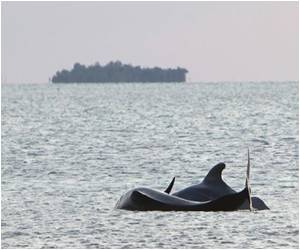
"To avoid potentially dangerous sea level rise, we could cut emissions of short-lived pollutants even if we cannot immediately cut carbon dioxide emissions," Aixue Hu of the National Center for Atmospheric Research (NCAR), the first author of the study said.
"This new research shows that society can significantly reduce the threat to coastal cities if it moves quickly on a handful of pollutants," Hu added.
The study, a collaboration of the Scripps Institution for Oceanography, NCAR, and Climate Central, is being published this week in the journal Nature Climate Change. It was funded by the National Science Foundation and the Department of Energy.
"It is still not too late, by stabilizing carbon dioxide concentrations in the atmosphere and reducing emissions of shorter-lived pollutants, to lower the rate of warming and reduce sea level rise," Veerabhadran Ramanathan of Scripps, who led the study, said.
"The large role of the shorter-lived pollutants is encouraging since technologies are available to drastically cut their emissions," he added.
Advertisement
As glaciers and ice sheets melt and warming oceans expand, sea levels have been rising by an average of about 3 millimeters annually in recent years (just more than one-tenth of an inch).
Advertisement
Such an increase could submerge densely populated coastal communities, especially when storm surges hit.
Despite the risks, policy makers have been unable to agree on procedures for reducing emissions of carbon dioxide. With this in mind, the research team focused on emissions of four other heat-trapping pollutants: methane, tropospheric ozone, hydrofluorocarbons, and black carbon.
These gases and particles last anywhere from a week to a decade in the atmosphere, and they can influence climate more quickly than carbon dioxide, which persists in the atmosphere for centuries.
Previous research by Ramanathan and Yangyang Xu of Scripps, a co-author of the new paper, has shown that a sharp reduction in emissions of these shorter-lived pollutants beginning in 2015 could offset warming temperatures by up to 50 percent by 2050.
Applying those emission reductions to sea level rise, the new research found that the cuts could dramatically slow rising sea levels. Their results showed that total sea level rise would be reduced by an estimated 22 to 42 percent by 2100, depending on the extent to which emissions were reduced.
However, the new study also found that delaying emissions cuts until 2040 would reduce the beneficial impact on year-2100 sea level rise by about a third.
If society were able to substantially reduce both emissions of carbon dioxide as well as the four other pollutants, total sea level rise would be lessened by at least 30 percent by 2100, the researchers concluded.
The researchers used mostly percentage changes for sea level rise, rather than actual estimates in centimeters, because of uncertainties over future temperature increases and their impacts on rising sea levels.
"We still have some control over the amount of sea level rise that we are facing," Hu said.
Source-ANI









